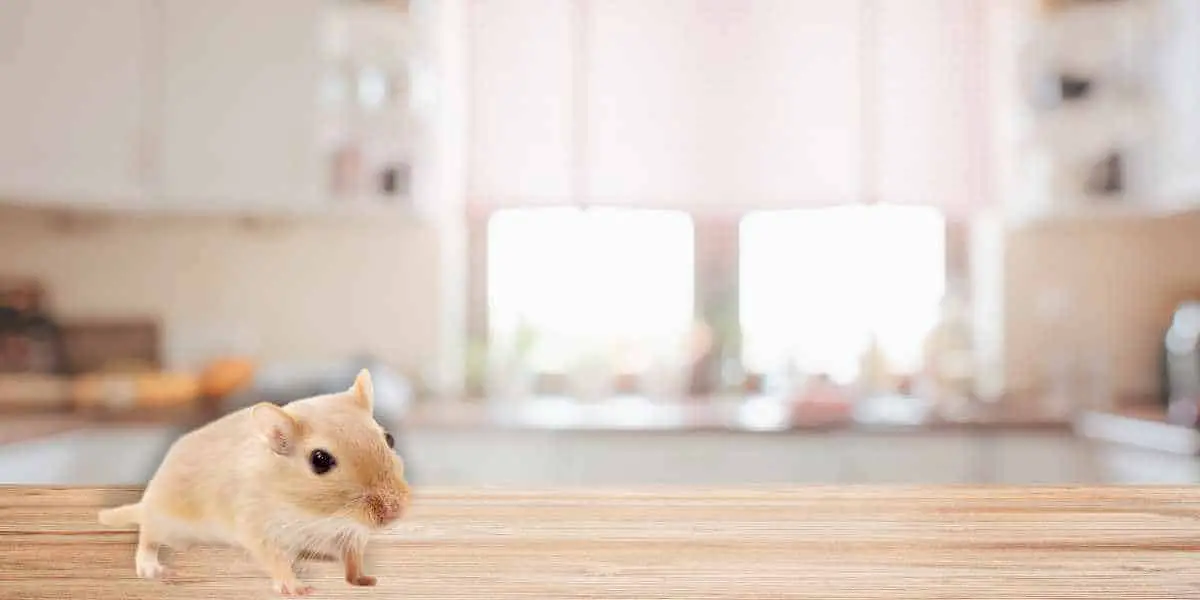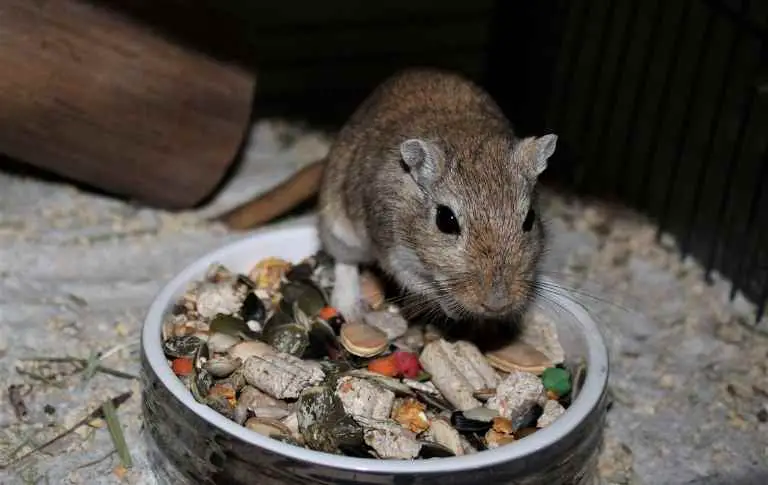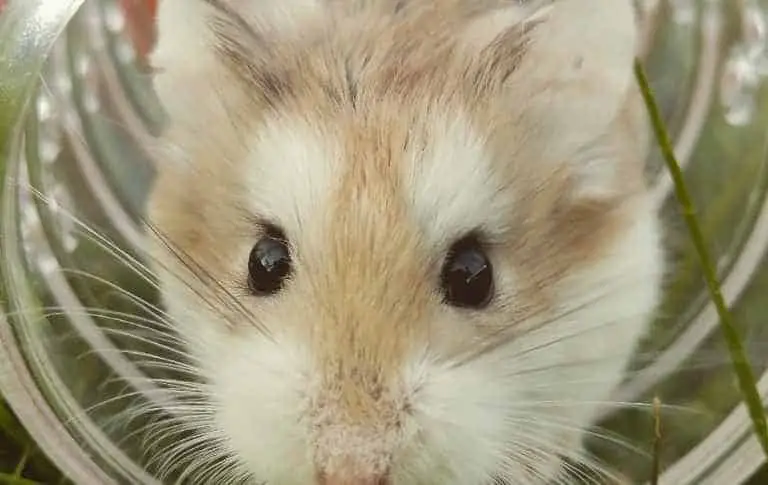Gerbils are small rodents native to the deserts of North Africa, Asia, and elements of Europe. They make popular pets due to their gentle nature and ease of handling. Because gerbils have different dietary needs than humans or other pet animals, it’s important to understand what is necessary for your gerbil to maintain optimal health.
In general, gerbils need a balanced diet that includes proteins from grains, oils from nuts and seeds, calcium from bone meal or pellets, and fats from juices and greens. Many commercial feeds are available for gerbils. It is important to read labels carefully as some commercial feeds may contain unnecessary ingredients such as sugar that could be detrimental to your pet’s health.
Some companies may supplement pellet-based feed with unhealthy ingredients like corn syrup or high-fructose corn syrup which should be avoided.
Table of Contents
What is a Gerbil’s Diet?
Gerbils are one of the most popular small pets for owners to keep. As with all pets, proper nutrition is essential for the health and well-being of your pet gerbil. To ensure your gerbil receives the necessary nutrients and vitamins, it is important to understand the basics of a gerbil’s diet and nutrition.
Natural Foods
Natural foods for gerbils include fruits, vegetables, grains, insects, and grasses. Your gerbil should always have access to fresh hay and water. If possible, make sure the hay is unadulterated and free of dyes and chemicals. A variety of foods will keep your gerbil healthy and help prevent boredom.
Fruits like apples, pears, bananas, raisins, tomatoes, and bell peppers provide vitamins, minerals, and fiber. Fruits can be fed fresh or dried but should be given sparingly due to their high sugar content – no more than 1 tablespoon per day is recommended.
Vegetables like carrots (grated), squash (cooked), sweet potatoes (cooked) green peppers fava beans can provide essential nutrients as well as flavor variety. Vegetables should be fed daily in small quantities to ensure optimal health benefits.
Grains like wheat bran, oat bran, millet seeds, or pearled barley can help your gerbil meet its daily fiber requirements while providing essential fuel. Grains should only be fed in limited quantities: no more than two tablespoons a day is recommended for an average-sized adult gerbil.
Insects such as mealworms and crickets can occasionally be fed to provide extra protein for your pet. Be sure to consult with a veterinarian before attempting this – mealworms are an acquired taste for some pets!
Grasshoppers are another treat but they should not become a staple in your gerbil’s diet due to their hard shells which can damage teeth if consumed frequently. A small piece of cooked chicken or turkey is also safe occasionally – just remember that high-fat meats due have nutritional value so moderation is key!
Finally don’t forget that fresh grasses are also important sources of nutrition for your pet – in their natural habitat gerbils would graze on grasses throughout the day so offering them a choice of safe edible grasses will give them access to vital micronutrients necessary for their upkeep.
Commercial Foods
Commercial gerbil foods are a convenient option to ensure your gerbil has a balanced diet. Quality pellet diets provide all the proteins, vitamins, minerals, and fiber they need. Natural ingredients and pellets that contain no added sugars are ideal as gerbils do not process sugar well.
Look for products that also contain vegetable proteins and complex carbohydrates as these are good sources of energy for your pet.
Other types of commercial dog food may also be suitable for gerbils, such as grain-based mixes, but should be chosen with caution to ensure that the diet is nutritionally adequate. There are many commercial products available in pet stores, so you can choose one that best fits your gerbil’s dietary needs.
Finally, adding a few fresh fruits or vegetables to their clean water bowl every few days will provide additional essential nutrients without overfeeding. However, too much produce can upset the balance of their diet so you’ll want to limit these treats to two or three times per week at most.

Nutritional Requirements
Did you recently get a gerbil as a pet? Do you want to make sure your pet gerbil is eating properly? Like all other animals, gerbils have certain nutritional requirements that must be met to ensure a long and healthy life.
Food, exercise, and a clean environment are important aspects of gerbil care. In this article, we will address the nutritional requirements of a gerbil and explore the various foods that are best for them.
Protein
Protein is the building block of gerbil nutrition and is essential for helping gerbils grow and maintain healthy muscles. The best sources of protein for gerbils are insects, commercial insect-based diets, and occasional treats of cooked proteins such as boiled chicken or eggs as well as high-quality seed mixes.
Insects are rich sources of essential vitamins, minerals, and amino acids, while some plant proteins are also valuable. Gerbils need around 15-20% protein in their diet.
Insects such as mealworms, waxworms, and crickets provide an excellent source of protein that is easy to find in pet stores or online; however, it’s important to note that there can be a risk of parasites with feeding live insects so make sure to observe caution when feeding these items. Commercial insect-based diets can provide the same benefit without the risk associated with live feeds;
however, make sure the ingredients list includes adequate amounts of animal proteins. Treats such as cooked eggs or boiled chicken should not replace regular diet but rather act as occasional supplements. Additionally, a good quality seed mix should also have between 10%-15% crude protein content for added benefit within your gerbil’s diet.
Fats
Fats are an essential part of a gerbil’s diet and provide them with the energy needed to be active and healthy. These fats should come from both animal and vegetable sources, as the body needs a mix of both for optimal health. A small amount of fat is also necessary for most vitamins to work properly, as well as for absorbing fat-soluble toxins.
The best sources of fat for gerbils include:
- Green leafy vegetables
- Fish
- Nuts and seeds
- Eggs
- Sunflower oil or other vegetable oils
It is important to monitor the amount of fat in your gerbil’s diet; too much can lead to obesity, while not enough can cause health problems due to a deficiency in essential fatty acids. To make sure your gerbil’s diet is balanced and contains just the right amount of fats, it is best to feed them a variety of foods that contain healthy fats.
Carbohydrates
Carbohydrates provide essential energy for a gerbil’s activities and should make up about 20-30% of their diet. This can be provided through a variety of foods, such as cereals, grains, fruits, and vegetables. Gerbils that are fed only seed mixes do not get enough carbohydrates in their diet to be healthy.
Good sources of carbohydrates for your gerbil include high-quality seeds (such as sunflower and safflower), rolled oats (uncooked), barley flakes, air-popped popcorn, hard-boiled eggs, fortified bran cereals (e.g., wheat germ cereal), whole wheat bread and pasta and cooked sweet potatoes or squash. Be sure to remove any uneaten food after your gerbil has finished eating.
Be sure to only feed fresh food to your gerbil in order to maintain good nutrition levels in their diet; stale food can contain bacteria that could affect their health and should not be consumed.
If you feed any grain products make sure they are finely ground; small pieces may become impacted in the digestive tract if chewed improperly by the gerbil, leading to health problems.
Vitamins and Minerals
In addition to providing plenty of food and clean water, it’s important to give your gerbil meals that contain a range of vitamins and minerals. This will help keep them healthy and full of energy.
The foods that provide the most nutrients are fresh vegetables and fruits, like apples, bananas, lettuce, celery, or carrots. You can also provide manufactured feeds designed specifically for gerbils.
These foods typically contain chaffhaye or timothy hay in addition to a variety of other grains and seeds. When offering timothy hay or chaffhaye remember to remove any uneaten portions after several hours. These products should be combined with fresh fruit and vegetables for a healthy diet complete with essential vitamins and minerals.
Protein is also an important part of the gerbil diet – either from fresh vegetables (for example, broccoli, sauteed spinach) or from zinc-fortified feed mixes which can provide 10-18% protein. A calcium supplement should be provided once a week as well – this type of supplement is commonly known as “Gerbil Nuts” and can easily be found at pet stores or online retailers.
It’s also important not to overfeed your gerbils – they should gain no more than 1% of total body weight per day according to the National Gerbil Society (NGS).
Abdominal obesity may be seen in some gerbils due to low activity levels; so providing your pets with plenty of physical activity through playtime helps them stay healthy while eating less food.
Feeding Tips for Gerbils
When it comes to gerbil nutrition, it’s important to provide your pet with a balanced diet that includes a variety of ingredients. A gerbil’s diet should be composed of nutritionally balanced and appropriate foods to ensure a long and healthy life.
In this article, we’ll cover all the essential feeding tips for gerbils to help pet owners understand the nutritional needs of their furry friends.
Variety
Providing your gerbil with a varied diet is essential for their well-being. A variety of food sources ensures that your pet gets all the nutrients they need to stay healthy and happy. A good rule of thumb is that 70% of their diet should be composed of a high-quality rodent pellet, while 10-15% should come from treats such as fresh fruits and vegetables, 3% can come from seeds and grains and the remaining 2-3% should come from proteins such as cooked egg or poultry meat.
Fresh fruits and vegetables are great treats for gerbils – but be careful to research which ones are safe for them. Fruits such as apples, grapes, pears, mangoes, and melons make good choices; vegetables like broccoli, carrots, celery, squash, and spinach are also suitable.
Be sure to wash the produce thoroughly before serving it to prevent bacteria or pesticide contamination. Nuts like almonds, walnuts, and pecans can also be offered as occasional treats in small amounts (no more than 2 nuts per week).
It’s also important to give your gerbil ample access to fresh water daily. You will need to change out their water bottle at least once a day so that the water remains fresh – this is especially important during warm months when bacteria growth increases if left unchanged.
Fresh hay should also be given daily in order to provide both dietary fiber as well as mental stimulation through playtime activities with it.
Portion Control
Portion control is an important piece of gerbil nutrition. Overfeeding your gerbil can cause it to become overweight, resulting in health issues and a shorter lifespan. Gerbils require a healthy balance of carbohydrates and proteins to remain healthy, though the exact ratio the animal needs will vary depending on the type, age, and activity level of the gerbil.
Carbohydrates come from a variety of items, including oats and barley, nutritional biscuit meal or laboratory blocks1, plain cereal (not sugar-sweetened varieties), nuts such as peanuts or sunflower seeds, and certain vegetables such as corn on the cob or sweet potatoes. Protein sources might include cooked eggs (with shell), cooked lean meats such as beef liver, cooked beans, and insects like mealworms.
Beware when feeding juice, sweets, or table food scraps; these occasional treats can increase messiness inside your pet’s living environment and may be unhealthy for your gerbil in large amounts. Monitor your pet for any signs of weight gain due to inappropriate portions.
A slight belly bulge is normal for a content gerbil eating its fill — divide daily portions into two feedings if necessary — but you should never allow your pet to become severely overweight or malnourished because it has an unrestricted food supply.
Freshness
In order to ensure the best quality and nutrition for your gerbil, it’s important that you choose fresh food. Each product has a different shelf life, so be sure to read the labels carefully. For instance, pelleted foods may remain nutritionally sound for up to three months after purchase, whereas fresh produce may need to be replaced more frequently.
When selecting fresh produce such as dark leafy greens, select those that are crisp and void of wilting leaves or blemishes. Additionally, expired food should never be fed to your gerbil as it can carry harmful bacteria and other microbes that may cause illness or disease.
It’s also important to note that food can expire even when stored correctly – exposure to humidity and heat can cause food to spoil prematurely. Therefore, store bulk items in airtight containers in a cool place away from direct sunlight.
Make sure you store fragile items like seeds, nuts, or grains in an area unaffected by pets or children who may move them around or accidentally spill them on the floor. Finally, check that all food is intact with no evidence of infestation – such as larva – before you feed your pet gerbil!
Conclusion
Giving your gerbil a balanced and nutritious diet is essential to ensure they remain healthy and active. A combination of fresh hay, pelleted feed, quality seed mix, fruits, vegetables, and occasional treats can help to provide all the nutrients they need while also satisfying their natural instinct to forage. Do try to avoid too many treats, however; if fruits and veggies are plentiful in your house it might encourage them to become picky about their food.
Any changes you make should be made gradually as sudden changes can cause problems. As with all animals, potential problems need to be spotted early on and addressed immediately in order to maintain a healthy pet.
If you pay attention to what your pet eats and recognize it has specific needs that must be met for good health, you’ll likely have a happy gerbil for many years!




